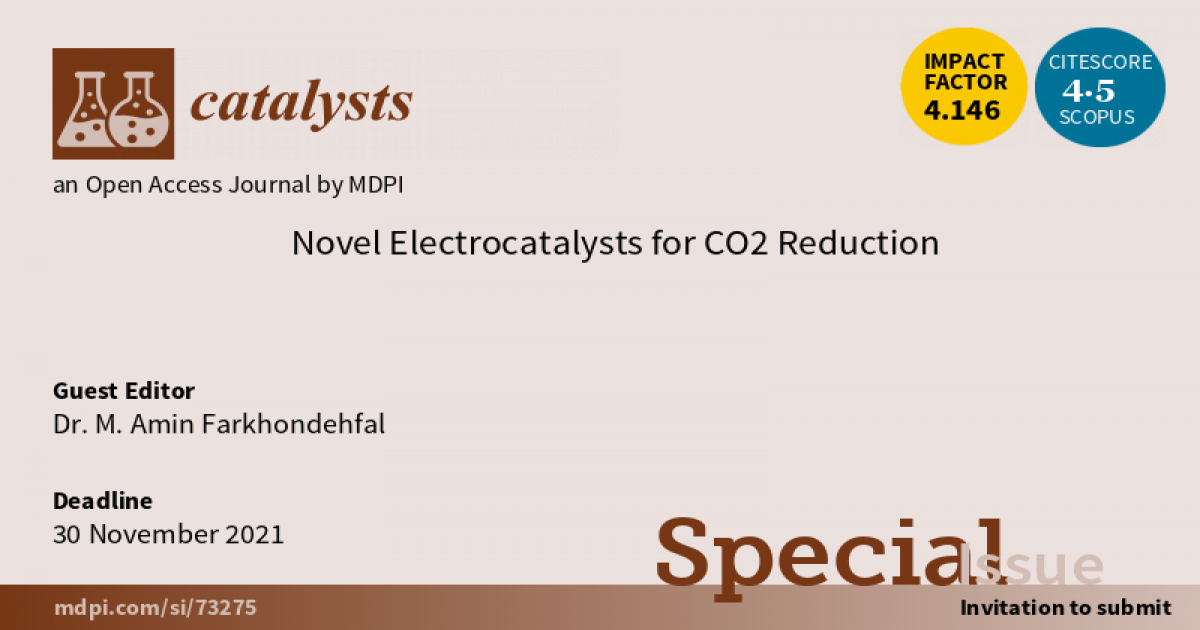Novel Electrocatalysts for CO2 Reduction
A special issue of Catalysts (ISSN 2073-4344). This special issue belongs to the section "Electrocatalysis".
Deadline for manuscript submissions: closed (30 November 2021) | Viewed by 3832

Special Issue Editor
Special Issue Information
Dear Colleagues,
The CO2 that comes from the use of fossil fuels accounts for about 65% of the global greenhouse gas emissions, and it plays a critical role in global climate change. Among the different strategies that have been used to address the storage and reutilization of CO2, the transformation of CO2 into chemicals or fuels with high added-value has been considered to be a winning approach. This transformation is capable of reducing carbon emissions and inducing a “fuel switching” that exploits renewable energy sources. However, the industrial utilization of CO2 to fuel is currently under development. Considerable emphasis has been placed on increasing the present low efficiency and low production rate. In fact, depending on the selected catalyst, reaction conditions and electrolyte, different products—such as carbon monoxide, formic acid, and hydrocarbons including methane, methanol, or mixtures thereof—can be obtained. Moreover, the CO2 is typically dissolved in aqueous media and, consequently, the hydrogen evolution reaction (HER) is in inevitable competition with CO2 reduction.
The scope of this issue is to exploit the possibility of novel nano structured non-noble materials to be used for the aforementioned applications, in high current densities and with high selectivity, toward the production of value added products. The thorough electrochemical analysis of the materials (from cyclic voltammetry to Impedance spectroscopy) is highly encouraged.
Dr. M. Amin Farkhondehfal
Guest Editor
Manuscript Submission Information
Manuscripts should be submitted online at www.mdpi.com by registering and logging in to this website. Once you are registered, click here to go to the submission form. Manuscripts can be submitted until the deadline. All submissions that pass pre-check are peer-reviewed. Accepted papers will be published continuously in the journal (as soon as accepted) and will be listed together on the special issue website. Research articles, review articles as well as short communications are invited. For planned papers, a title and short abstract (about 100 words) can be sent to the Editorial Office for announcement on this website.
Submitted manuscripts should not have been published previously, nor be under consideration for publication elsewhere (except conference proceedings papers). All manuscripts are thoroughly refereed through a single-blind peer-review process. A guide for authors and other relevant information for submission of manuscripts is available on the Instructions for Authors page. Catalysts is an international peer-reviewed open access monthly journal published by MDPI.
Please visit the Instructions for Authors page before submitting a manuscript. The Article Processing Charge (APC) for publication in this open access journal is 2200 CHF (Swiss Francs). Submitted papers should be well formatted and use good English. Authors may use MDPI's English editing service prior to publication or during author revisions.
Keywords
- Electrocatalyst
- CO2 reduction
- Formic Acid
- Current density
- Impedance spectroscopy
- Electrochemistry
- nano structures
Benefits of Publishing in a Special Issue
- Ease of navigation: Grouping papers by topic helps scholars navigate broad scope journals more efficiently.
- Greater discoverability: Special Issues support the reach and impact of scientific research. Articles in Special Issues are more discoverable and cited more frequently.
- Expansion of research network: Special Issues facilitate connections among authors, fostering scientific collaborations.
- External promotion: Articles in Special Issues are often promoted through the journal's social media, increasing their visibility.
- Reprint: MDPI Books provides the opportunity to republish successful Special Issues in book format, both online and in print.
Further information on MDPI's Special Issue policies can be found here.





